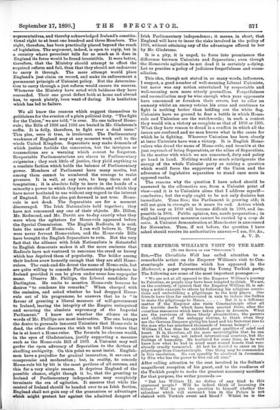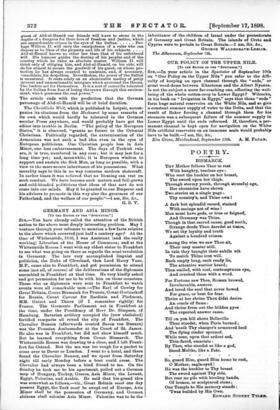THE EMPEROR WILLIAM'S VISIT TO THE EAST.
[To THR EDITOR OF TIIK " SPECTATOR."1
SIR,—The Christliche Welt has called attention to a remarkable article on the Emperor William's visit to Con- stantinople and Palestine which has appeared in the Mechveret, a paper representing the Young Turkish party. The following are some of the most important passages:— " We are not at all opposed to the Emperor William's journey to Palestine, as people may have been tempted to think. We are, on the contrary, of opinion that the Emperor William IL is set- ting a noble example to others by following his religious convic- tions and undertaking a pilgrimage to the holy places. Our friends have thus far endeavoured in vain to induce the Sultan
to make the pilgrimage to Mecca But it is a different matter if the Emperor also visits Constantinople after all the terrible deeds which have been enacted there, after the countless massacres which have taken place in Armenia. What are the survivors of those bloody abominations, the parents and children of the unhappy victims, to think when they see the German Emperor giving his hand and his fraternal kiss to
the man who has murdered thousands of human beings ? William II. has thus far exhibited great qualities of mind and heart. It is, therefore, all the more unintelligible that he can ignore in this way, not indeed international courtesy, but the feelings of humanity. He hesitated for some time, as he well knew how what be had in mind must wound hearts that were already cruelly tormented. At last he decided to enter on his pilgrimage from Constantinople. One thing may be commended in this resolution. He can speedily be absolved in Jerusalem by Him who has the power to blot out all sins."
After calling attention to the cost involved in the Sultan's magnificent reception of his guest, and to the readiness of the Turkish people to make the greatest necessary sacrifices for that purpose, the writer proceeds :—
"But has William IL no duties of any kind to this oppressed people ? Will he indeed think of loosening its fetters ? Will he put the question to himself whether the splendour which will surround him in the Palace is not stained with Turkish sweat and blood ? Whilst he is the
guest of Abd-ul-Hamid our friends will have to atone in the depths of a dungeon for their love of freedom and justice, which
are unpardonable crimes in the eyes of the Sultan Per- haps William IL will envy the omnipotence of a ruler who can dispose as he likes of the property and life of his subjects. . . . . Abd-ul-Hamid knows no other law than that of his unfettered will. His humour guides the destiny of his peoples and of the country which he rules as absolute master. William II. will think only of obliging him, and Abd-ul-Hamid, on his side, will do his utmost to secure the goodwill of his guest, on whose pro- tection he has always counted to maintain, and, if necessary, lonsolidate, his despotism. Nevertheless, the power of the Sultan is unnatural. It rests solely on an abominable medley of petty interest and unmentionable intrigues which surround the throne. The leaders act for themselves. It is a sort of camarilla tolerated by the Sultan from fear of losing the crown through this environ- ment, which possesses the real power."
The article ends with the prediction that the German patronage of Abd-ul-Hamid will be of brief duration.
The Christliche Welt, which is published in Leipsic, accom- panies its citations from the Mechveret by some remarks of its own which would hardly be tolerated in the German secular Press anywhere, and would probably have got the editor into trouble in Berlin. "The policy of the European States," it is observed, "grants no future to the Oriental Christians. Politically regarded, the extermination of the Armenians was not such a bad idea even in the eyes of European politicians. One Christian people less in Asia
Minor, one less embarrassment. The days of Turkish rule are, it is true, numbered in any case ; but it may last for a long time yet; and, meanwhile, it is European wisdom to support and sustain the Sick Man, as long as possible, with a view to the more secure inheritance of his possessions. What morality says to this in no way concerns modern statecraft. In earlier times it was believed that no blessing can rest on such conduct. We have become such mature and full-grown and cold-blooded politicians that ideas of that sort do not come into our minds. May it be granted to our Emperor and his advisers to promote in this way also the greatness of our Fatherland, and the welfare of our people."—I am, Sir, Sce.,
G. S. V.



































 Previous page
Previous page